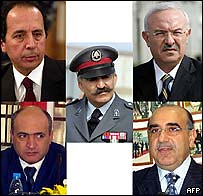Police swoop on former Mukhabaraat Heads in Beirut
Police have arrested 3 former Security Chiefs (below) in Beirut in connection with the murder of Rafiq Al-Hariri. Mustafa Hamdan, the current head of the guards of President Emile Lahoud has also turned himself in to the police.
Hamdan was implicated by the UN investigator for his role in the murder.
The other three are:
-the feared Public Security Director Jamil al-Sayyed, seen as the most powerful man in the country
-Internal Security Forces head, Ali al-Hajj
-Military Intelligence head, Raymond Azar
All three resigned after the 'unity marches' of February and arch this year - many of the demonstrators blamed these people personally.
Although the officials were connected with Syrian hegemony in Lebanon, the news will be a relief to Syria, which has come under fire by the UN investigator for being slow to co-operate.
Former MP Nassir Qandil is also being sought by Lebanese police for his role in the murder.







